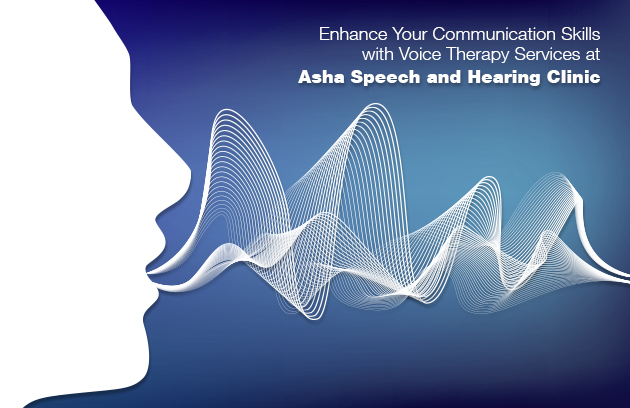Effective communication is an essential aspect of our daily lives. Whether it’s voice therapy techniquest‘s personal relationships, professional interactions, or public speaking engagements, a clear and confident voice plays a crucial role. However, many individuals face difficulties with their voice, hindering their ability to express themselves effectively. Fortunately, Asha Speech and Hearing Clinic provides voice therapy services to help individuals improve their quality of voice in turn makes individual’s communication skills effective and helps in regaining confidence in their speaking abilities.
Understanding Voice Disorders:
Voice disorders encompass a range of conditions that affect the quality, pitch, loudness, or resonance of an individual’s voice. These disorders can result from various factors, such as vocal cord nodules, polyps, muscle tension, vocal misuse or abuse, neurological conditions, or psychological factors. Common symptoms include hoarseness, breathiness, vocal fatigue, sensation of something stuck in the throat, pitch breaks, and reduced vocal range.
The Role of Voice Therapy:
Voice therapy is a specialized form of speech therapy that focuses on the assessment and treatment of voice disorders. It is a collaborative process between the individual and a certified speech-language pathologist (SLP) who specializes in voice therapy. At Asha Speech and Hearing Clinic, our team of experienced SLPs provides comprehensive voice evaluations and develops personalized treatment plans tailored to everyone’s needs.
Services Offered at Asha Speech and Hearing Clinic:
1. Voice Assessment: Our SLPs conduct a detailed assessment to evaluate the individual’s vocal quality, pitch, loudness, resonance, and any associated physical or psychological factors. This assessment helps in identifying the underlying causes of the voice disorder.
2. Individualized Treatment Plans: Based on the assessment results, our SLPs develop customized treatment plans targeting the specific needs of everyone. Treatment may include a combination of vocal exercises, breathing techniques, relaxation strategies, and vocal hygiene practices.
3. Vocal Technique Training: Our SLPs provide guidance and training on proper vocal techniques, including breath control, pitch modulation, resonance, and articulation. These techniques help individuals optimize their voice production and enhance their overall vocal quality.
4. Vocal Health Education: Education plays a vital role in voice therapy. Our SLPs educate individuals about vocal hygiene practices, vocal warm-up exercises, and strategies to prevent vocal strain or injury. This knowledge empowers individuals to take care of their voices and maintain long-term vocal health.
5. Counselling and Emotional Support: Voice disorders can significantly impact an individual’s self-esteem and confidence. At Asha Speech and Hearing Clinic, our SLPs offer counselling and emotional support to help individuals cope with the psychological aspects of voice disorders and build self-confidence in their communication skills.
Voice therapy can be beneficial for various conditions, including:
1. Vocal nodules or polyps: These are noncancerous growths on the vocal cords that can affect voice quality. Therapy may involve techniques to reduce vocal cord strain and promote vocal hygiene.
2. Vocal cord paralysis or paresis: This condition occurs when the vocal cords are unable to move completely. Voice therapy can help improve vocal cord function and restore voice quality.
3. Muscle tension dysphonia: This is a condition characterized by excessive tension in the muscles around the larynx. Voice therapy techniques aim to reduce muscle tension and improve vocal control.
4. Transgender voice therapy: For individuals seeking to modify their voice to align with their gender identity, voice therapy can provide techniques to develop a voice that feels more authentic and comfortable.
5. Professional voice users: Voice therapy can be beneficial for individuals who rely on their voice for professional reasons, such as singers, actors, teachers, or public speakers. It can help improve voice projection, endurance, and overall vocal health.
During voice therapy, the therapist will assess the individual’s voice, identify specific areas of concern, and develop a personalized treatment plan. Therapy techniques may include vocal exercises, breath control exercises, relaxation techniques, and strategies to promote vocal health and prevent voice-related issues.
Benefits of Voice Therapy:
Engaging in voice therapy at Asha Speech and Hearing Clinic offers numerous benefits, including:
1. Improved Vocal Quality: Voice therapy helps individuals develop a clear, strong, and resonant voice, enhancing their overall communication abilities.
2. Increased Confidence: Overcoming voice difficulties and acquiring effective communication skills can significantly boost an individual’s self-confidence in personal and professional settings.
3. Enhanced Public Speaking Skills: Voice therapy equips individuals with the tools and techniques to deliver powerful and engaging presentations, speeches, or performances.
4. Reduced Vocal Strain: Voice therapy teaches individuals proper vocal techniques and vocal hygiene practices, reducing the risk of strain or injury to the vocal cords.
5. Long-Term Vocal Health: By gaining a better understanding of their voice and how to take care of it, individuals can maintain long-term vocal health and prevent the recurrence of voice disorders.
Conclusion:
Asha Speech and Hearing Clinic is dedicated to helping individuals overcome voice disorders and enhance their quality of life. With the expertise of our certified SLPs and personalized voice therapy services, individuals can regain control over their voice, boost their self-confidence.

